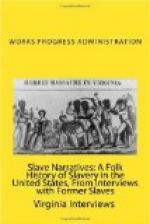‘Free at las’,
Free at las’,
Thank God Almighty
I’s free at las’.
Mmmmm, mmmmm, mmmmm.’
“I only seen the Klu Klux Klan onct. They was a-paradin’ the streets here in Brookhaven. They had a Nigger that they was a-goin’ to tar an’ feather.
“When the mistis tol’ us we was free (my pappy was already dead, then) my mammy packed us chillun up to move. We travelled on a cotton wagon to Covington, Louisiana. We all worked on a farm there ’bout a year. Then all ‘cept me moved to Mandeville, Louisiana an’ worked on a farm there. I hired out to Mr. Charlie Duson, a baker. Then we moved to a farm above Baton Rouge, Louisiana an’ worked for Mr. Abe Manning. We jus’ travelled all over from one place to another.
“Then I got a letter from a frien’ o’ mine in Gainesville, Mississippi. He had a job for me on a boat, haulin’ lumber up the coast to Bay St. Louis, Pass Christian, Long Beach, Gulfport, an’ all them coast towns. I worked out o’ Gainesville on this boat for ’bout two year. I lost track o’ my family then an’ never seen ’em no more.
“In the year 1870 I got the call from the Lord to go out an’ preach. I left Gainesville an’ travelled to Summit, Mississippi where another frien’ o’ mine lived. I preached the words of the Lord an’ travelled from one place to another.
“In 1873 I got married an’ decided to settle in Brookhaven. I preached an’ all my flock believed in me. I bought up this house an’ the two on each side of it. Here I raised seven chillun in the way o’ the Lord. They is all in different parts of the country now, but I sees one of ’em ever’ now an’ then. Las’ April the Lord seen fit to put me a-bed an’ I been ailin’ with misery ever since.
“The young folks now-a-days are happy an’ don’t know’ bout war an’ slavery times, but I does. They don’t know nothin’ an’ don’t make the mark in the worl’ that the old folks did. Old people made the first roads in Mississippi. The Niggers today wouldn’ know how to act on a plantation. But they are happy. We was miserable.
“Slavery days was bitter an’ I can’t forgit the sufferin’. Oh, God! I hates ’em, hates ’em. God Almighty never meant for human beings to be like animals. Us Niggers has a soul an’ a heart an’ a min’. We aint like a dog or a horse. If all marsters had been good like some, the slaves would all a-been happy. But marstars like mine ought never been allowed to own Niggers.
“I didn’ spec nothin’ out of freedom ‘ceptin’ peace an’ happiness an’ the right to go my way as I pleased. I prays to the Lord for us to be free, always.
“That’s the way God Almighty wants it.”
Henri Necaise, Ex-Slave, Pearl River County
FEC
Mrs. C.E. Wells
Rewrite, Pauline Loveless
Edited, Clara E. Stokes
HENRI NECAISE
Nicholson, Mississippi
Henri Necaise, ex-slave, 105 years old, lives a half-mile south of Nicholson on US 11. Uncle Henri lives in a small plank cabin enclosed by a fence. He owns his cabin and a small piece of land. He is about five feet ten inches tall and weighs 120 pounds. His sight and hearing are very good.




